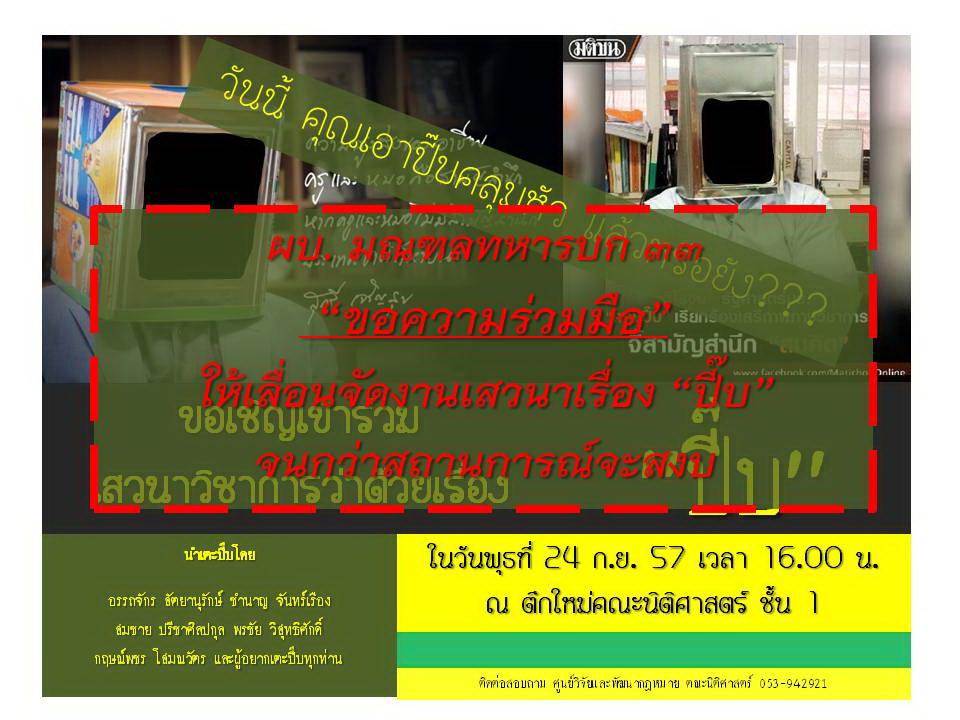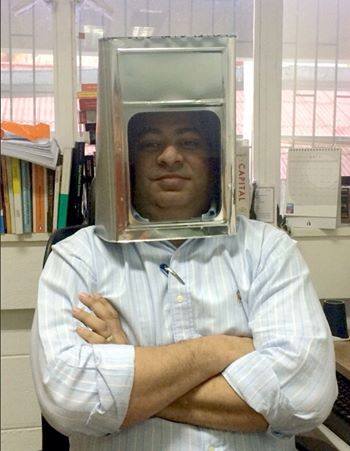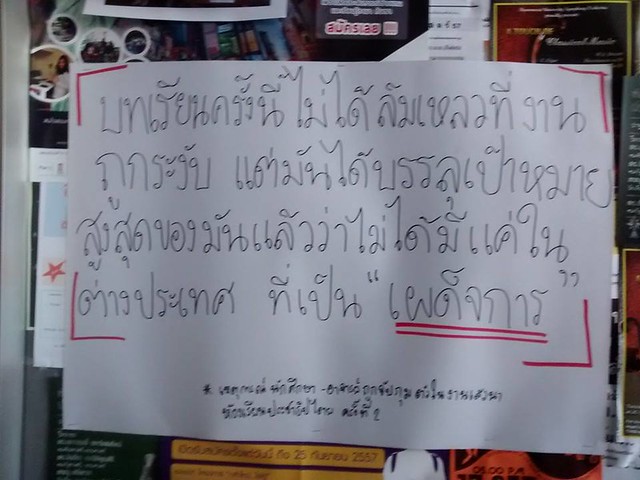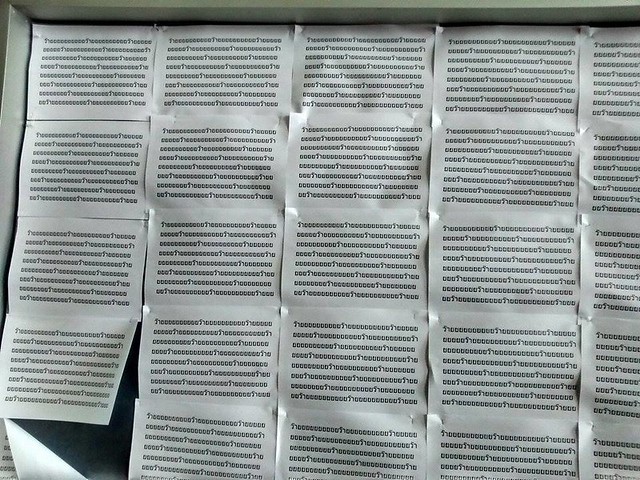
Peep or metal buckets are normally used for packaging food. However, the square covers at the top allow people to put thier heads in easily, leading to the common proverb (Photo curtesy from weekendhobby)

The original text in the background aksked if you have covered your head with a bucket yet today. However, the red banner reads "the Army Chief asked for cooperation to postpone the seminar on Peep or metal bucket," (Photo curtesy of Faculty of Law Chiang Mai University)

Sukree Charoensuk covering his head with metal bucket at the Deal Office of Mahidol (Photo curtesy of Matichon)
Later on Monday, Viroj Ali, a lecturer at the Political Science Faculty of Thammasat University, was the first to adopt the action as a protest against the junta’s actions to limit academic freedom.

Viroj covering his head with metal bucket in his office (curtesy from Matichon)
On the same day, another political science lecturer from Chiang Mai University, Somchai Preechasilpakul, announced his support for academics covering their head with metal boxes in symbolic protest against the junta’s censorship in education.
“The beginning of the use of metal boxes symbolically allows academics who want to get involved with the governing of the junta, to make them realise that their regime is no more legitimate than that of politicians and they should spend their time, which they have been juggling among many positions, to fulfil their responsibility in raising the ranking of universities instead,” said Somchai.
Earlier on 18 September, the police stormed an academic seminar at Thammasat University and forced it to be abandoned. The topic of the seminar that was deemed to be dangerous and ironically obstructive to the junta’s attempt to create a functioning democracy was “The Collapse of Dictatorial Regimes Overseas”. Obviously, the panel was strictly about overseas tyranny and did not discuss Thai politics or the Thai dictatorship.
After the seminar was forced to stop, the police briefly detained for about three hours four prominent social science academics, Nidhi Eoseewong, Prajak Kongkirati, Chaowarit Chaowsangrat, and Janjira Sombutpoonsiriand, and three undergraduate students from the progressive League of Liberal Thammasat for Democracy (LLTD) student group, who organized the event.
The next day, according to the Thai Student Centre for Democracy (TSCD), police in and out of uniform ripped off posters and announcements around the Social Science building of Thammasat University, Rangsit Campus.
These posters were largely not related to politics. However, many criticized the junta’s order to stop the seminar or carried statements criticizing Somkid Lertpaithoon, the Thammasat University President, who is now serving in the junta’s National Legislative Assembly.
“The lesson from the seminar today did not end when the seminar was forced to stop, but it has reached its important point that dictatorships do not only exist in foreign countries,” said one poster on the board, now taken down.

One of the posters on the SC board in Thammasat Rangsit Campus says the seminar that was forced to cancel has achieved its agenda no matter what
The students responded by putting up posters read “Waiiiiiiiiiiiiiiiiiiii” which is the sound of women’s screaming in Thai to mock the junta.

Plain text of women's scream written as "Waiiii" to mock the junta
Earlier, in late May, six students from Mahasarakham University who organized an anti-coup protest were summoned to a military camp and threatened with guns and enforced-disappearance. One of the students had to flee the country as the military kept harassing him.
In May, four students from Ramkhamhaeng University faced the same predicament after they merely distributed stickers with anti-coup messages.
This catalogue of repression also includes many outspoken anti-coup academics of Thailand’s leading universities who were ordered to report to the military and keep their mouths shut since.
Gen Prayuth Chan-Ocha, the head of the junta, said earlier that he is not a dictator, but recently forbad academics from holding discussions about dictatorship at Thammasat University, reasoning that these seminars cannot be held because it could harm the reconciliation process. Ironically, the general added that there is a governance process on whether to order the cancellation of an academic forum.
“There is a committee to check whether the contents of the seminars and discussions are appropriate or not, I’m not the one who is doing this alone. The committee checks whether certain things can be said or not. Discussions about democracy and elections can’t be held and people are not yet allowed to criticize the government,” said Prayuth on last Friday in response to those who opposed the military intervention in a seminar at Thammasat University, Rangsit Campus.
During his talk last week, Prayuth urged people to understand that his actions were intended to kickstart the reconciliation process and create a functioning democracy in Thailand, while in fact he is silencing mainly the anti-establishment red-shirt and the anti-coup side.
Piyabutr Saengkanokkul, a Thammasat law lecturer from the courageous Nitirat academic law group, challenged Prayuth, saying that he should not have stopped the seminar about the collapse of dictatorial regimes overseas last week if he is sure that he is not a dictator.
“Gen Prayuth Chan-Ocha once told representatives of foreign businesses that he is not a dictator. The NCPO has never admitted it is a dictator. Today’s seminar talks about dictators overseas. Why do the army and authorities need to be so scared?” Piyabutr posted on his Facebook page on 18 September 2014.
On 21 September, 60 academics from 16 universities responded to the junta’s 18 September crackdown on students and academics at Thammasat University with their concerns and submitted a letter to the police and military.
“The unacceptable actions of the police and military are obviously harmful to academic freedom. All academics who have signed this letter urge the junta to stop intimidating academics and students immediately,” said the statement signed by 60 academics.
Academics now need to ask for permission from the military to hold seminars and discussions by sending the contents of their seminars to the police, said Kanokrat Lertchoosakul, a lecturer from the Political Science Faculty of Chulalongkorn University and one of the signatories.
Sirawith Seritiwat, one member of LLTD who was detained for several hours for taking part in organizing the seminar last week, told Prachatai that the majority of students at Thammasat University also responded with disappointment and concern to the abrupt cancellation of the political seminar and the bulletin boards that were wiped clean by the police.
“Now it is difficult to organize academic seminars. We have to go asking for permission from the municipality, police, and the military. This is against academic freedom and liberty,” said Sirawith.
The junta’s attempts to silence anti-coup academics and students are not confined only to Thailand.
According to New Mandala, a well-known academic website about Southeast Asia based at the Australian National University (ANU), the Thai embassy in Canberra has been trying to lobby ANU administrators and government officials to put pressure on the Website team to refrain from encouraging academic debates on sensitive issues concerning Thai politics.
“The embassy indicated to some members of the ANU community that they should not expect cooperation from Thai government agencies or officials in Thailand, given that they are from the ANU. Thai students, both at ANU and elsewhere, have been warned not to have contact with New Mandala. Those associated with New Mandala are not welcome in Thailand. It has also been reported that the ANU was offered Thai government funding for a Thai studies centre, on the unstated but obvious condition that New Mandala’s critical activities cease. The ANU declined the offer and, as reported, the financial support went to Melbourne University instead,” said New Mandala.
Thailand is a party to the International Covenant on Civil and Political Rights (ICCPR), which obliges the state to protect the rights of individuals to freedom of opinion, expression, association, and assembly. However, the reality after the coup d’état in May is the opposite.

Since 2007, Prachatai English has been covering underreported issues in Thailand, especially about democratization and human rights, despite the risk and pressure from the law and the authorities. However, with only 2 full-time reporters and increasing annual operating costs, keeping our work going is a challenge. Your support will ensure we stay a professional media source and be able to expand our team to meet the challenges and deliver timely and in-depth reporting.
• Simple steps to support Prachatai English
1. Bank transfer to account “โครงการหนังสือพิมพ์อินเทอร์เน็ต ประชาไท” or “Prachatai Online Newspaper” 091-0-21689-4, Krungthai Bank
2. Or, Transfer money via Paypal, to e-mail address: [email protected], please leave a comment on the transaction as “For Prachatai English”
